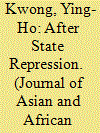|
|
|
Sort Order |
|
|
|
Items / Page
|
|
|
|
|
|
|
| Srl | Item |
| 1 |
ID:
188953


|
|
|
|
|
| Summary/Abstract |
The Chinese government has imposed the National Security Law which has resulted in Hong Kong formally entering into a phase of movement abeyance. By analysing 3377 posts on LIHKG Internet forum, this article re-explores the online protest attitude during this movement abeyance. The findings indicate that content creators are more attentive in regard to criticizing the legislation and pro-Beijing figures, followed by seeking international support and calling for unity. Users are more ‘participative’ in calling for mutual destruction between the authorities and people, initiating mutual support and seeking emigration. This study provides new perspectives on the study of movement abeyance.
|
|
|
|
|
|
|
|
|
|
|
|
|
|
|
|
| 2 |
ID:
192602


|
|
|
|
|
| Summary/Abstract |
Professional and liberal-oriented news media in Hong Kong have been under severe political pressure since the establishment of the National Security Law in 2020. Journalists now have to navigate a more dense and uncertain legal minefield. Self-censorship has intensified. This article argues that self-censorship and other media responses can be better understood under the broader framework of risk culture. Drawing upon 43 in-depth interviews with journalists from 12 organizations, this article reconstructs how news organizations and journalists have developed methods to assess and manage risk and describes the characteristics of their risk assessment and management and the changing character of self-censorship. The emerging risk cultures have helped maintain organizational stability and journalistic professional identity. The concluding discussion elaborates on the implications of the analysis for understanding self-censorship and press freedom in Hong Kong, briefly compares Hong Kong’s situation with mainland China’s, and reflects on the possible development of risk cultures in other institutional contexts.
|
|
|
|
|
|
|
|
|
|
|
|
|
|
|
|
| 3 |
ID:
177082


|
|
|
|
|
| Summary/Abstract |
The Hong Kong crisis, which began with massive demonstrations against the Fugitive Offenders and Mutual Legal Assistance in Criminal Matters Legislation (Amendment) Bill in June 2019, has persisted over a long period. Although these demonstrations were originally organized to oppose the said bill, the government’s hardline approach to the issue made the demonstrators turn toward using increasingly intense methods of protesting. Further, the original stance of opposing the bill underwent a shift toward opposing the government, finally culminating into a full-fledged pro-democracy movement critical of the system that exists in Hong Kong. Consequently, citizens’ interest in politics increased, the sense of identity as a “Hongkonger” deepened, and even “Hong Kong nationalism” began to stir. Finally, the Trump administration, which had previously paid no attention to these developments, signed the Hong Kong Human Rights and Democracy Act into law and prepared to impose sanctions on China.
In response, in May 2020, the Chinese government declared the imposition of the Hong Kong National Security Law. On June 30, 2020, it enacted the Law of the People’s Republic of China on Safeguarding National Security in the Hong Kong Special Administrative Region and enforced it in Hong Kong. This law provides scope for widespread interference by the central government in Hong Kong’s legislative, administrative, and judicial processes, thereby weakening its autonomy. Not only did the vague wording of the law constrain Hong Kong’s citizens about their freedom being compromised, but it was also implemented as a means to suppress the pro-democracy supporters in Hong Kong. However, the Hong Kong National Security Law was strongly opposed by the international community, and the US began imposing sanctions.
Hong Kong is the front line in a “new cold war” situation between the US and China. The fact that the Hong Kong issue led to US-imposed sanctions on China symbolizes the escalation of the geopolitical “new cold war” in East Asia between these two powers. Therefore, the outcome of the Hong Kong issue could potentially determine the future of this region.
|
|
|
|
|
|
|
|
|
|
|
|
|
|
|
|
|
|
|
|
|